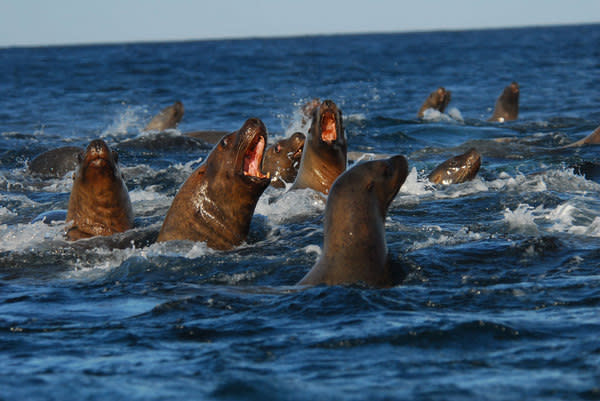 Daily Brew
Daily BrewEnvironmentalists upset after charges in B.C. sea lion deaths dropped

Fish farming is a controversial business in British Columbia at the best of times.
Atlantic salmon are raised in giant pens that float in secluded coastal inlets. It's a lucrative industry but biologists claim it's responsible for diseases that damage nearby wild salmon runs and that escaped farm fish could potentially establish themselves in salmon streams, displacing native species.
But a lesser-known problem made waves this week with news the federal Department of Fisheries and Oceans dropped charges against a major producer after dozens of sea lions were caught in protective netting and drowned.
Grieg Seafood B.C., an arm of a Norwegian-based aquaculture giant Grieg Seafood ASA, faced nine counts under the Fisheries Act of unlawfully destroying marine mammals in the deaths of 65 sea lines and several seals. The animals became entangled in the nets surrounding fish pens near Gold River, on the west coast of Vancouver Island, in 2010.
[ Related: B.C. fish farm avoids charges over deaths of almost 70 sea lions ]
Grieg B.C. managing director Stewart Hawthorn told the Victoria Times Colonist the company reported the incident to the Fisheries Department, issued a statement and promised to install barriers that don't harm marine mammals.
Since the drownings, the company has spent $2 million to make its nets deeper, stronger and heavier to repel predators attracted by the captive fish. Only four sea lions have died since then, Hawthorn said.
“We’re not perfect yet, but we’ve made huge improvements,” Hawthorn said. “Our goal, absolutely, is to be non-harmful when it comes to any marine mammals at our farms.”
The 2010 drownings were attributed to an unprecedented increase in the number of California sea lions in the area that year. Before 2010, no marine mammals had accidentally drowned in any of Grieg's 21 B.C. fish farms, Hawthorn told the Times Colonist.
The Fisheries Department agreed Monday to accept $100,000 worth of restorative justice work instead of prosecuting. The money will be used for public education and wild salmon enhancement projects. The deal is supported by a forum made up of residents of the Gold River area, including politicians, local First Nations and outside scientists, the Times Colonist reported.
But the Georgia Strait Alliance, a major B.C. environmental group, is upset by the decision not to follow through on charges.
“The thing that is really disappointing is that there’s no mention of how [fish-farm practices] will actually improve because of this,” Ruby Berry, salmon aquaculture campaign director, told the Globe and Mail.
Berry said all the worthy causes Grieg is supporting under the agreement do nothing to prevent marine mammals from becoming fatally entangled in fish-farm netting, despite the company's promise to improve protection.
“What we are seeing from DFO are decisions that continually allow [fish farms] to keep doing the same things," she told the Globe and Mail. "Sea lions are predators of salmon and they will keep going after these farmed fish, as long as those fish are in the water.
“The fish farming industry has been telling us for 25 years they have solved the problem [of accidental seal and sea-lion deaths] but it just keeps happening.”
[ Related: No 'smoking gun' for Fraser River sockeye salmon collapse ]
Berry also criticized the makeup of the community forum that developed the restorative-justice deal, saying environmental groups were not represented.
"This whole process was a surprise to us," she said.
British Columbia's aquaculture sector was worth $533.8 million in farmgate value in 2010, according to B.C. government statistics. The overwhelming percentage came from farmed salmon, with B.C. the fourth largest producer in the world behind Norway, Chile and Britain.
But while it's touted as a major job and revenue generator, the industry has been put on the defensive for years by critics who question the environmental impact of open-water net pens. Salmon farming figured prominently in the Cohen Commission hearings on the 2009 collapse of the Fraser River sockeye run, which issued its report last October.


